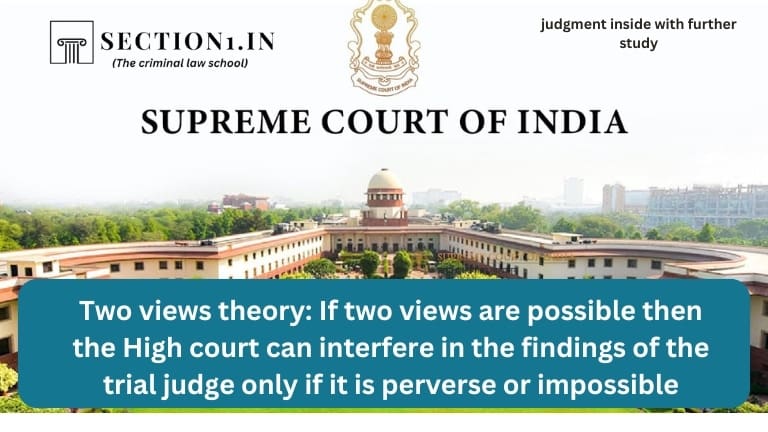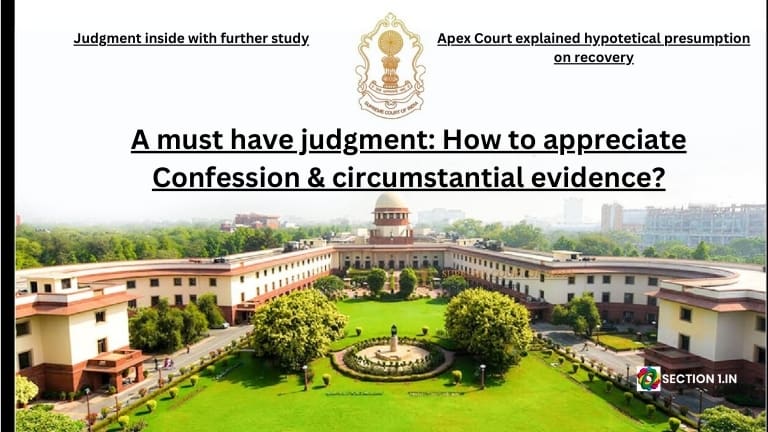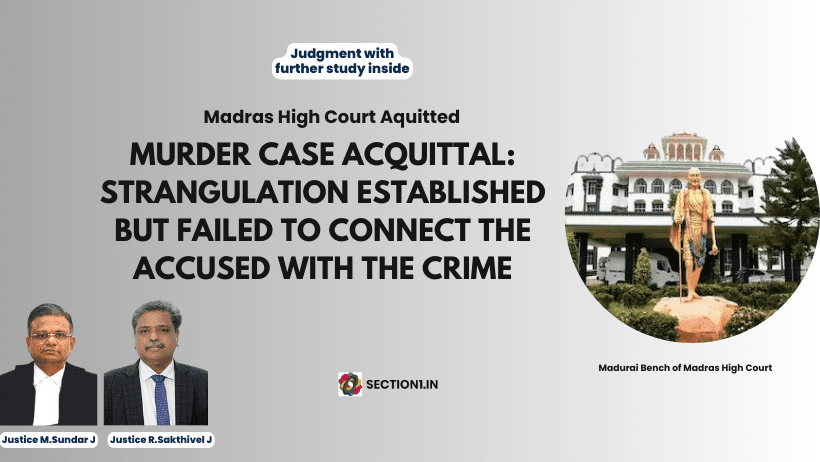Challenging the reversal of acquittal by the High Court
1. The present appeal challenges the judgment dated 6th April 2018 passed by the High Court of Madhya Pradesh at Jabalpur in Criminal Appeal No. 261 of 1995, thereby allowing the appeal of the respondent-State which was filed challenging the judgment dated 26th March 1994 passed in S.T. No. 160 of 1992, vide which the learned 2nd Class Sessions Judge, Damoh (hereinafter referred to as ‘the learned trial Judge’) had acquitted the appellants of the charges under Sections 302, 201 and 34 of the Indian Penal Code, 1860 (hereinafter referred to as ‘IPC’). The High Court, reversing the judgment of the learned trial Judge, had convicted the appellant No. 1 (Ballu Chaurasiya @ 2 Balram @ Balmukund) under Sections 302 and 201/34 of IPC and appellant No. 2 (Halki Bahu @ Jamna Bai @ Jamuna Bai) under Sections 302/34 and 201 of IPC and awarded rigorous imprisonment for life under Sections 302 and 302/34 with fine of Rs. 1000/-, in default of payment of fine to further undergo rigorous imprisonment for three months. Insofar as Sections 201 and 201/34 of IPC are concerned, the High Court further awarded sentence of rigorous imprisonment for seven years with a fine of Rs. 3000/-, in default of payment of fine to further undergo rigorous imprisonment for 5 months.
Case rests on circumstantial evidence
6. Undoubtedly, the prosecution case rests on circumstantial evidence. The law with regard to conviction on the basis of 5 circumstantial evidence has very well been crystalized in the judgment of this Court in the case of Sharad Birdhichand Sarda v. State of Maharashtra1 , wherein this Court held thus:
“paras. 152, 153 and 154”
Chain of evidence must be complete as against the accused without any hypothesis except the accused is guilty
7. It can thus clearly be seen that it is necessary for the prosecution that the circumstances from which the conclusion of the guilt is to be drawn should be fully established. The Court holds that it is a primary principle that the accused ‘must be’ and not merely ‘may be’ proved guilty before a court can convict the accused. It has been held that there is not only a grammatical but a legal distinction between ‘may be proved’ and ‘must be or should be proved’. It has been held that the facts so established should be consistent only with the guilt of the accused, that is to say, they should not be explainable on any other hypothesis except that the accused is guilty. It has further been held that the circumstances should be such that they exclude every possible hypothesis except the one to be proved. It has been held that there must be a chain of evidence so complete as not to leave any reasonable ground for the conclusion consistent with the innocence of the accused and must show that in all human probabilities the act must have been done by the accused.
Suspicious cannot take place of proof
8. It is settled law that the suspicion, however strong it may be, cannot take the place of proof beyond reasonable doubt. An accused cannot be convicted on the ground of suspicion, no matter how strong it is. An accused is presumed to be innocent unless proved guilty beyond a reasonable doubt.
The law regarding interference by the appellate court
9. Apart from that, it is to be noted that the present case is a case of reversal of acquittal. The law with regard to interference by the Appellate Court is very well crystallized. Unless the finding of acquittal is found to be perverse or impossible, interference with the same would not be warranted. Though, there are a catena of judgments on the issue, we will only refer to two judgments which the High Court itself has reproduced in the impugned judgment, which are as reproduced below:
“13. In case of Sadhu Saran Singh vs. State of U.P. (2016) 4 SCC 397, the Supreme Court has held that:- “In an appeal against acquittal where the presumption of innocence in favour of the accused is reinforced, the appellate Court would interfere with the order of acquittal only when there is perversity of fact and !aw. However, we believe that the paramount consideration of the Court is to do substantial justice and avoid miscarriage of justice which can arise by acquitting the accused who is guilty of an offence. A miscarriage of justice that may occur by the acquittal of the guilty is no less than from the conviction of an innocent. Appellate Court, while enunciating the principles with regard to the scope of powers of the appellate Court in an appeal against acquittal, has no absolute restriction in law to review and relook the entire evidence on which the order of acquittal is founded.
14. Similar, In case of Harljan Bhala Teja vs. State of Gujarat (2016) 12 SCC 665, the Supreme Court has held that:- “No doubt, where, on appreciation of evidence on record, two views are possible, and the trial court has taken a view of acquittal, the appellate court should not interfere with the same. However, this does not mean that in all the cases where the trial court has recorded acquittal, the same should not be interfered with, even if the view is perverse. Where the view taken by the trial court is against the weight of evidence on record, or perverse, it is always open far the appellate court to express the right conclusion after reappreciating the evidence If the charge is proved beyond reasonable doubt on record, and convict the accused.
Homicidal death is admitted fact
11. It is not in dispute that the death of the deceased is a homicidal death and as such, it will not be necessary to refer to the medical evidence. The only question that remains is as to whether the prosecution has proved its case beyond reasonable doubt and as to whether the appellants are guilty of committing 10 the crime.
Appreciation of trial court judgment of acquittal
13. The above points, that we have culled out from the judgment of the learned trial Judge, make it clear that the learned trial Judge has done a very elaborate exercise of discussing the evidence in great detail. We therefore would not like to burden our judgment with more details. The aforesaid points are more than sufficient to come to a conclusion that the prosecution has failed to prove any of the incriminating circumstances beyond reasonable doubt and in no case, the chain of circumstances, which was so interlinked to each other that leads to no other conclusion, than the guilt of the accused persons. We have no hesitation to hold that the findings of the learned trial Judge are based on correct appreciation of the material placed on record.
Reversal of acquittal by the high court is in cursory way
19. At the cost of repetition, we are compelled to say that the findings of the High Court are totally based on conjectures and surmises. Though the High Court has referred to the law laid down by this Court with regard to the scope of interference in an appeal against acquittal, the High Court has totally misapplied the same and a very well-reasoned judgment based upon the correct appreciation of evidence by the trial Court has been reversed by the High Court, only on the basis of conjectures and surmises.
High court can interfere in the findings of the trial judge only if it is perverse or impossible
20. The High Court could have interfered in the criminal appeal only if it came to the conclusion that the findings of the trial Judge were either perverse or impossible. As already discussed hereinbefore, no perversity or impossibility could be found in the approach adopted by the learned trial Judge.
Two views theory
21. In any case, even if two views are possible and the trial Judge found the other view to be more probable, an interference would not have been warranted by the High Court, unless the view taken by the learned trial Judge was a perverse or impossible view.
Finally, Hon’ble Supreme Court has set aside the judgment of the Hon’ble High Court which reversed the acquittal into one of conviction and released the accused from the charges levelled against them.
Party
BALLU @ BALRAM @ BALMUKUND AND ANOTHER …APPELLANT(S) VERSUS THE STATE OF MADHYA PRADESH …RESPONDENT(S) – CRIMINAL APPEAL NO. 1167 of 2018 – 2024 INSC 258
https://main.sci.gov.in/supremecourt/2018/23738/23738_2018_3_1501_51854_Judgement_02-Apr-2024.pdf
Further study
- ALL PRINCIPLES ON APPRECIATION OF EVIDENCE DISCUSSED _ S.C
- FORGERY NOT PROVED BY THE PROSECUTION.
- APPRECIATION OF EVIDENCE IN APPEAL AGIANST AQUITTAL
- Section 106 Evidence Act: Yardstick in convicting accused in circumstantial evidence invoking s.106 Evidence Act
- ACQUITTAL – SECTION 304-B IPC – APPRECIATION OF CROSS-EXAMINATION EXPLAINED.







1 Comment
[…] Two views theory: If two views are possible then the High court can interfere in the findings of the… […]